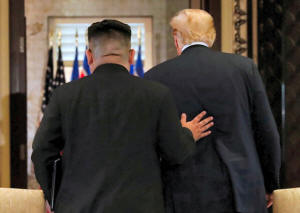|
Recovery of U.S. troops' remains in North
Korea complicated by cash, politics
 Send a link to a friend
Send a link to a friend
 [July 24, 2018]
By Joyce Lee [July 24, 2018]
By Joyce Lee
SEOUL (Reuters) - When North Korean leader
Kim Jong Un agreed in June to help return the remains of American troops
killed in the 1950-53 Korean War, it was seen as one of the more
attainable goals to come out of his summit with U.S. President Donald
Trump.
American officials expect North Korea to hand over around 50 sets of
remains in coming weeks, but the drawn out process of negotiations to
get to this point highlights the complications involve in the issue.
At the heart of the difficulty, former officials involved in previous
recovery missions say, are likely demands from North Korea for cash
compensation, as well as the unsolved tensions over North's nuclear
weapons and ballistic missile arsenal.
More than 7,700 U.S. troops who fought in the Korean War remain
unaccounted for, with about 5,300 of those lost in what is now North
Korea, according to the Defence POW/MIA Accounting Agency (DPAA), the
U.S. military agency tasked with tracking down prisoners of war and
troops missing in action.
The Korean War ended in a truce, not a peace treaty, leaving the United
States and North Korea still technically at war.
Soon after the June summit, Trump announced North Korea had returned the
remains of 200 soldiers that had already been found. However,
negotiations over the actual handing over of the remains have dragged
on.

"The North Koreans are using the remains issue as a bargaining chip,"
said Bill Richardson, a former U.S. diplomat with experience negotiating
with North Korea, including during the recovery of the remains of seven
Americans in 2007.
"They're stalling," he told Reuters in an interview by phone. "I think
in the end the North Koreans will turn over the majority of the remains
that they have - but it will have a price. Not just a financial price."
REMAINS RETURNED
Between the 1990 and 2005, more than 400 caskets of remains found in
North Korea were returned to the United States, and the bodies of some
330 Americans were accounted for, according to the DPAA.
Decades-old remains that North Korea has handed over in the past have
not always been identifiable as U.S. troops.
The U.S. and North Korea worked together on so-called joint field
activities (JFAs) to recover remains from 1996-2005, until Washington
halted operations expressing concerns about the safety of its personnel.
A Congressional Research Service (CRS) report said the United States
paid $28 million to North Korea for assistance in the effort.
"To the best of my knowledge, it was never based on a per body
calculation. Payments were made in support of each field mission – each
joint recovery operation," said Frank Jannuzi, a former Democratic
Senate Foreign Relations Committee staffer focusing on East Asian and
Pacific affairs. Payments were to compensate North Korea for direct
expenses incurred such as fuel costs, disruption of agricultural
planting, or equipment costs, he said.
In 2011, Barack Obama's administration agreed with Pyongyang to restart
recovery missions, offering to pay $5,669,160 in "compensation" for
services provided by North Korea.
Those planned missions never happened, however, as the Washington called
off the deal after North Korea tested a rocket in early 2012, said Paul
M. Cole, author of 'POW/MIA Accounting'.
[to top of second column]
|

President Donald Trump and North Korea's leader Kim Jong Un leave
after signing documents that acknowledge the progress of the talks
and pledge to keep momentum going, after their summit at the Capella
Hotel on Sentosa island in Singapore June 12, 2018. REUTERS/Jonathan
Ernst/File Photo

"If the past is any indicator, the (North Koreans) are demanding
up-front deliveries of food, fuel and at least $5 million in cash,"
Cole told Reuters. "In the era of 'maximum pressure,' the dilemma
for the Trump administration is whether to give the (North Koreans)
massive amounts of food, fuel, trucks, SUVs and millions in cash, or
cancel the deal."
Former officials say typically North Korea has not asked for
compensation when it unilaterally returns remains it recovers, such
as the roughly 200 currently being discussed.
But if the United States hopes to send its own teams into North
Korea, there will likely be a cost.
Asked whether the cost of future joint field activities would be
similar to what was paid in the past, the Pentagon's DPAA Public
Affairs Office said: "As of yet, there are no JFAs scheduled in
North Korea so we cannot speculate on what such activities may
cost."
The U.S. State Department did not have an immediate comment on the
negotiations, but Secretary of State Mike Pompeo said on June North
Korea had made a commitment to unilateral return the first remains
"in the next couple weeks".
According to CRS, the United States also paid for recovery
operations in Vietnam. As with North Korea, critics complained the
Vietnamese government charged "extraordinarily high fees for
providing support... and that the services received are by no means
as lavish as the bills presented indicate".
South Korea's former Vice Minister of Foreign Affairs and Trade Kim
Sung-han said Pyongyang would likely want to use the return of
remains to improve its relations with Washington, while avoiding
addressing more touchy subjects such as denuclearization.

"North Korea wants the war declared ended sooner rather than later
so trust can be built and progress on its international standing can
be made," he said, adding that any "reimbursements" were likely to
violate sanctions.
Besides being politically sensitive, however, handing the North
Korean government stacks of cash offers no guarantee that
authenticated U.S. servicemen's remains would be recovered, Jannuzi
said.
"We might spend a million dollars and come up with nothing."
(Additional reporting by Jeongmin Kim and Josh Smith in SEOUL,
Arshad Mohammed and Daphne Psaledakis in WASHINGTON; Editing by
Lincoln Feast.)
[© 2018 Thomson Reuters. All rights
reserved.]
Copyright 2018 Reuters. All rights reserved. This material may not be published,
broadcast, rewritten or redistributed.
Thompson Reuters is solely responsible for this content. |